Samacheer Kalvi 3rd Standard Science Book Solutions Term 1 Chapter 2 States of Matter
I. Indicate whether the following statements are true or False:
Question 1.
Solids have a definite volume.
Answer:
True
Question 2.
Liquids can not flow.
Answer:
False
Question 3.
We can melt any substance by cooling it.
Answer:
False
Question 4.
Liquids can take the shape of a container.
Answer:
True
Question 5.
Gases have a definite shape or volume.
Answer:
False
Question 6.
Matter changes its state when heat is added or removed.
Answer:
True
Question 7.
A fuel is a substance which gives heat energy on burning.
Answer:
True
![]()
II. Fill in the blanks:
(Evaporation, Mass, Water, Solid, Stone, Freezing)
Question 1.
The measure of matter ¡n an object is _________.
Answer:
Mass
Question 2.
Change of liquid into vapour on heating is called _______.
Answer:
Evaporation
Question 3.
An example for liquid is _______
Answer:
Water
Question 4.
The change of liquid into solid on cooling is known as _______.
Answer:
Freezing
Question 5.
An example for solid is _______.
Answer:
Stone
![]()
III. Draw a line to match the objects and their state of matter:
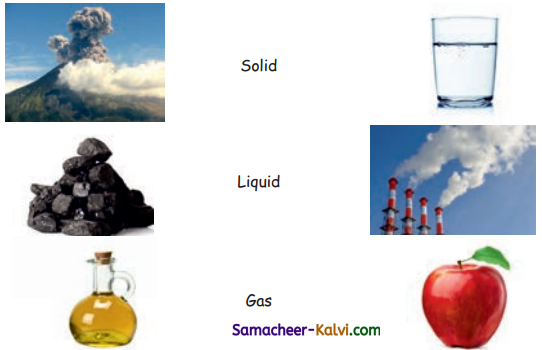
Answer:
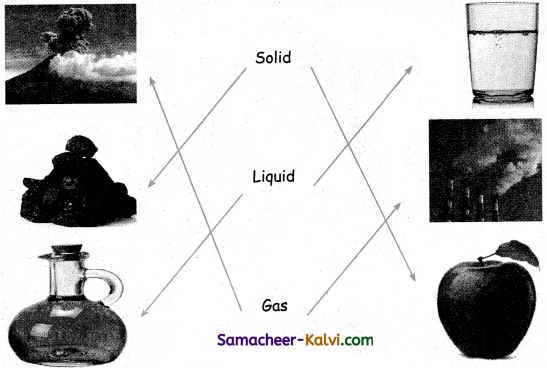
![]()
IV. Answer in a word or two:
Question 1.
Which of these is a solid: wood or juice? ______
Answer:
Wood.
Question 2.
Which of these is hard : a sponge or a glass or a cloth? ______
Answer:
a glass.
Question 3.
What are three states of matter? _______
Answer:
Solid, Liquid, Gas.
Question 4.
Name three substances which can change to liquid when they are heated?
Answer:
Ice, Cheese, Jaggery.
![]()
Question 5.
In which state of matter the particles are very close to each other?
Answer:
Solid State.
Question 6.
What state of matter is rain?
Answer:
Liquid State.
Question 7.
Which among the state of matter has definite size but no definite shape?
Answer:
Liquid State.
Question 8.
What would cause a liquid to turn into a solid?
a) Pouring it into a container
b) Heating it until it boils
c) Cooling it until it freezes
d) Keeping its temperature the same
Answer:
c) Cooling it until it freezes
Question 9.
What are some properties of pencil?
Answer:
- Pencil is rigid.
- It has definite shape and volume.
- It occupies a fixed space.
- They cannot move freely.
![]()
V. Find me: (Liquid, Water, Wood)
Question 1.
I am a five letter word. I am an essential need for your life. I remain in all the three states of matter. Who am I
Answer:
I am water.
Question 2.
I am a solid. I am obtained from the trees. I am useful for heating. Who am I?
Answer:
I am wood.
Question 3.
I am one among the three states. I have loosely arranged particles. I become vapour on heating. Who am I?
Answer:
I am liquid.
![]()
VI. Describe the word in one sentence:
Question 1.
Solid :
Answer:
Solids are things that have a definite shape and volume.
Question 2.
Liquid:
Answer:
Liquids are things that do not have a definite shape but occupies space.
Question 3.
Melting:
Answer:
Change of solid into liquid on heating is called melting.
Question 4.
Evaporation:
Answer:
Change of liquid into vapour on heating is called evaporation.
Question 5.
Freezing:
Answer:
Change of liquid into solid on cooling is known as freezing.
![]()
VII. Which change of state is taking place in each description below?

a. An ice cube turning to water _________
Answer:
Melting
b. Water turning to ice in a freezer _________
Answer:
Freezing
c. Change of liquid into vapour on heating _________
Answer:
Evaporation
d. A bathroom mirror misting up _________
Answer:
Condensation
![]()
Intext Activity:
Let us Do (Text Book Page No. 103):

Answer:
- House
- Chair
- Board
- Car
![]()
Let us Do (Text Book Page No. 105):
- Place four 1L bottles of different shapes on the table.
- Take a bucket with water.
- Call one child to hold the empty bottles and the other to fill water into them using a paper cup.
- Ask the other children to fill the table as given below.
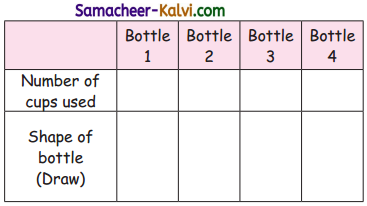
Did each bottle need the same number of cups to get filled?
We can see that water takes up the same space in each bottle and the shape of the water is same as the shape of the bottle.
Answer:

![]()
Think Zone (Text Book Page No. 105):
Question 1.
What is the shape of water in your bottle?
Answer:
The water takes up the shape of my bottle.
Question 2.
What happens if you pour water on the floor or table?
Answer:
Spread from one place to another place.
Think Zone (Text Book Page No. 106):
Question 1.
Cooking gas in gas cylinder has a smell. Why?
Answer:
Because Ethyl mercaptan is added with LP& to find the leakage.
![]()
Let us Do (Text Book Page No. 107):
Say whether it is Solid or Liquid or Gas (Put ‘S’ for Solid, .’L‘ for Liquid and ‘G’ for Gas).
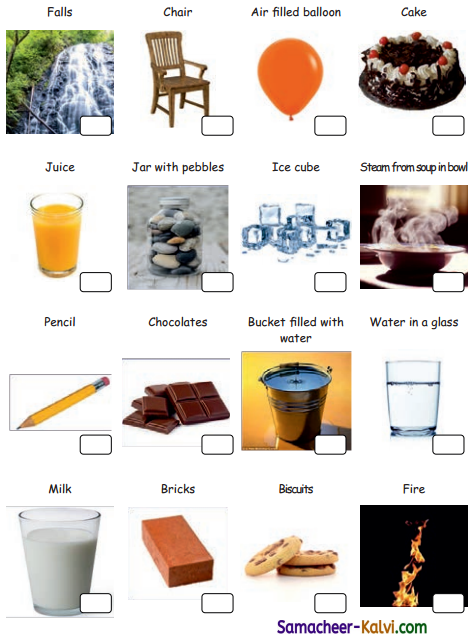
Answer:
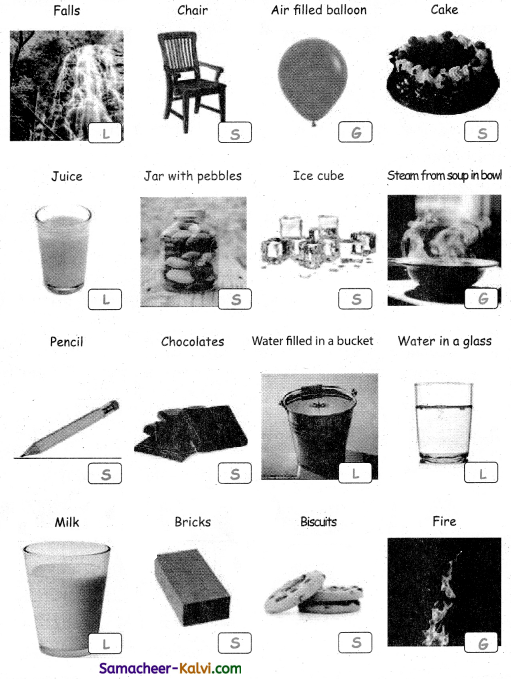
Let us Read and Complete the table (Text Book Page No. 108):
Here are some properties of matter:

Copy the following table. Write each property in the correct column of the table. Some properties may belong to more than one column.

Answer:
| Properties of solids | Properties of liquids | Properties of gases |
| Fixed Shape
Rigid Fixed volume |
No fixed shape
Flow all sides Fixed volume |
No fixed shape
Flow all sides No fixed volume |
![]()
Let us Do (Text Book Page No. 108):
Question 1.
Take some ice cubes in a container. Heat the container and observe the changes.
Answer:
Ice cubes melt.
Question 2.
Take some cheese in a container.. Heat the container and observe the changes.
Answer:
Cheese melts.
Question 3.
Take some jaggery in a pan. Heat the pan and observe the changes.
Answer:
Jaggery melts.
![]()
Let us think (Text Book Page No. 109):
Question 1.
What makes the coconut oil freeze in winter season?

Answer:
In winter season room temperature will drop down almost below 20°C which is less than the freezing point of coconut oil. So it freeze in winter season.
Complete the table (Text Book Page No. 109):

Answer:

![]()
Think and answer (Text Book Page No. 109):
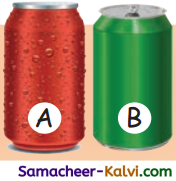
a. Which can was taken from the fridge?
Answer:
Can A.
b. How do you know?
Answer:
Water droplets appear on the can A.
c. How did water droplets appear on the can A?
Answer:
Because of condensation.
d. Why are there no water droplets on can B?
Answer:
Can B is not kept in the fridge.
![]()
Let us Understand (Text Book Page No. 109):
Question 1.
Keep a stone on the floor. Does it move by itself?
Answer:
No.
Question 2.
Pour a mug of water on the floor. Does the water flow? Does it flow in one direction?
Answer:
Yes, the water flows in all direction.
Question 3.
Take an air filled balloon. Prick it with a needle. Does the air rush out?
Answer:
Yes.
Question 4.
Fill an open vessel with water. Press the surface of the water with your hands. How do you feel?
Answer:
Water overflows.
![]()
Look at the pictures. Write down what you see. (Text Book Page No. 110):
(Wood, Leaves, Paper)
Question 1.
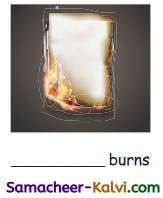
Answer:
Paper burns
Question 2.
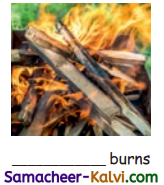
Answer:
Wood burns
Question 3.
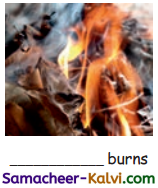
Answer:
Leaves burns\
![]()
Match the following:
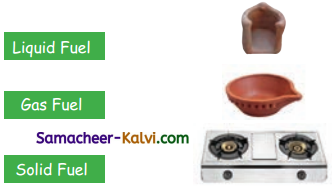
Answer:
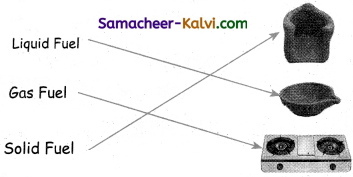
3rd Standard Science Guide States of Matter Additional Questions and Answers
I. Choose the correct answer:
Question 1.
_______ becomes liquid and liquid becomes solid on colling.
(a) Matter
(b) Mass
(c) Gas
Answer:
(c) Gas
Question 2.
Change of liquid into solid on cooling is known as __________
(a) freezing
(b) condensation
(c) evaporation
Answer:
(a)freezing
Question 3.
Which one of the following is a solid fuel?
(a) Petroleum
(b) Wood
(c) Diesel
Answer:
(b) Wood
Question 4.
________ has a definite shape.
(a) Solid
(b) Liquid
(c) Gas
Answer:
(a) Solid
![]()
II. Write True or False:
Question 1.
Everything you can see and touch is made up of matter.
Answer:
True
Question 2.
The change of solid into liquid on heating is called evaporation.
Answer:
False
Question 3.
Electrical energy is also used as fuel for cooking and transporting.
Answer:
True
Question 4.
Substances when burnt give out heat.
Answer:
True
![]()
III. Fill in the blanks:
Question 1.
_______ take the shape of the container.
Answer:
Liquids
Question 2.
_______ is a mixture of gases.
Answer:
Air
Question 3.
The space occupied by an object is called ________.
Answer:
Volume
Question 4.
Everything around us is made up of _________.
Answer:
matter
![]()
IV. Answer in a word or two:
Question 1.
What is matter?
Answer:
Anything that occupies space and has mass is called matter.
Question 2.
What is mass?
Answer:
Mass is a measure of how much matter is in an object.
Question 3.
List out the examples of gases?
Answer:
- Cloud
- Smoke
- Wind
- Spray
- Water vapour